
Somerset is a county in South West England which borders Gloucestershire and Bristol to the north, Wiltshire to the east, Dorset to the south-east and Devon to the south-west. It is bounded to the north and west by the Severn Estuary and the Bristol Channel, its coastline facing southeastern Wales. Its traditional border with Gloucestershire is the River Avon. Somerset is currently formed of six council areas, of which two are unitary authorities, until the four second-tier district councils are merged on 1 April 2023, after which the county will comprise three unitary authorities. Its county town is Taunton.

South West England is one of nine official regions of England. It consists of the counties of Bristol, Cornwall, Dorset, Devon, Gloucestershire, Somerset and Wiltshire. Cities and large towns in the region include Bath, Bristol, Bournemouth, Cheltenham, Exeter, Gloucester, Plymouth and Swindon. It is geographically the largest of the nine regions of England covering 9,200 square miles (23,800 km2), but the third-least populous, with approximately five million residents.
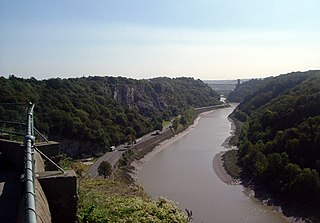
The River Avon is a river in the south west of England. To distinguish it from a number of other rivers of the same name, it is often called the Bristol Avon. The name 'Avon' is a cognate of the Welsh word afon, meaning 'river'.
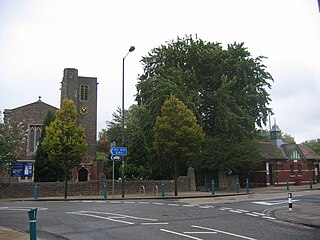
Avonmouth is a port and outer suburb of Bristol, England, facing two rivers: the reinforced north bank of the final stage of the Avon which rises at sources in Wiltshire, Gloucestershire and Somerset; and the eastern shore of the Severn Estuary. Strategically the area has been and remains an important part of the region's maritime economy particularly for larger vessels for the unloading and exporting of heavier goods as well as in industry including warehousing, light industry, electrical power and sanitation. The area contains a junction of and is connected to the south by the M5 motorway and other roads, railway tracks and paths to the north, south-east and east.

Anglian Water is a water company that operates in the East of England. Anglian Water is regulated under the United Kingdom Water Industry Act 1991. It came into existence in 1989 as part of the partial privatisation of the water industry. It took on the water supply, sewerage and sewage treatment responsibilities of Anglian Water Authority. The remaining functions of the authority transferred to the newly formed Environment Agency.
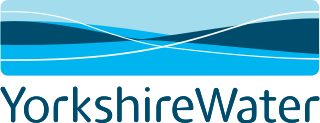
Yorkshire Water is a water supply and treatment utility company servicing West Yorkshire, South Yorkshire, the East Riding of Yorkshire, part of North Lincolnshire, most of North Yorkshire and part of Derbyshire, in England. The company has its origins in the Yorkshire Water Authority, one of ten regional water authorities created by the Water Act 1973, and privatised under the terms of the Water Act 1989, when Yorkshire Water plc, the parent company of the Yorkshire Water business, was floated on the London Stock Exchange. The parent company was Kelda Group in 1999. In February 2008, Kelda Group was bought by a consortium of infrastructure funds.

Thames Water Utilities Ltd, known as Thames Water, is a large private utility company responsible for the public water supply and waste water treatment in most of Greater London, Luton, the Thames Valley, Surrey, Gloucestershire, north Wiltshire, far west Kent, and some other parts of England; it has a considerable local monopoly. Thames Water is the UK's largest water and wastewater services company, and supplies 2.6 billion litres of drinking water per day, and treats 4.7 billion litres of wastewater per day. The area covered by Thames Water has a population of 15 million, that comprise 27% of the UK population.

Southern Water is the private utility company responsible for the public wastewater collection and treatment in Hampshire, the Isle of Wight, West Sussex, East Sussex and Kent, and for the public water supply and distribution in approximately half of this area. Some areas within the Southern Water region are supplied by a number of smaller water supply companies. Southern Water supplies an area totalling 4,450 sq. km. and serves 2.26 million customers.

South West Water provides drinking water and waste water services throughout Devon and Cornwall and in small areas of Dorset and Somerset. South West Water was created in 1989 with the privatisation of the water industry. It was preceded by the South West Water Authority which was formed by the Water Act 1973 as one of ten regional water authorities formed by a merger of various statutory and local authority water undertakings. South West Water is part of the Pennon Group.
Bristol is a city in south west England, situated near the Bristol Channel coast, approximately 106 miles (170 km) west of London. Several factors have influenced the development of its transport network. It is a major centre of employment, retail, culture and higher education, has many historic areas, and has a history of maritime industry. The city has a population of 450,000, with a metropolitan area of 650,000, and lies at the centre of the former County of Avon, which includes many dormitory towns, and has a population of one million. Additionally, it has the seventh highest population density of any English district.
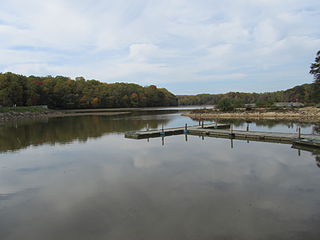
Lake Accotink is a reservoir in North Springfield in Fairfax County, Virginia, United States. Lake Accotink is formed by the damming of Accotink Creek. The lake is surrounded by Lake Accotink Park.
The majority of public transport users in the Bristol Urban Area are transported by bus, although rail has experienced growth and does play an important part, particularly in peak hours. There were plans for a light rail system, however this has now been dropped although it remains in the long-term local transport plan.

Pollution of the Ganges, the largest river in India, poses significant threats to human health and the larger environment. The river, which is severely polluted with human waste and industrial contaminants, provides water to about 40% of India's population across 11 states, serving an estimated population of 500 million people, which is more than any other river in the world.
The Mangotsfield and Bath branch line was a railway line opened by the Midland Railway Company in 1869 to connect Bath to its network at Mangotsfield, on its line between Bristol and Birmingham. It was usually referred to as "the Bath branch" of the Midland Railway.

The earliest known infrastructure for transport in Somerset is a series of wooden trackways laid across the Somerset Levels, an area of low-lying marshy ground. To the west of this district lies the Bristol Channel, while the other boundaries of the county of Somerset are along chains of hills that were once exploited for their mineral deposits. These natural features have all influenced the evolution of the transport network. Roads and railways either followed the hills, or needed causeways to cross the Levels. Harbours were developed, rivers improved, and linked to sources of traffic by canals. Railways were constructed throughout the area, influenced by the needs of the city of Bristol, which lies just to the north of Somerset, and to link the ports of the far south-west with the rest of England.
A regional water authority, commonly known as a water board, was one of a group of public bodies that came into existence in England and Wales in April 1974, as a result of the passing of the Water Act 1973. This brought together in ten regional units a diverse range of bodies involved in water treatment and supply, sewage disposal, land drainage, river pollution and fisheries. They lasted until 1989, when the water industry was privatised and the water supply and sewerage and sewage disposal parts became companies and the regulatory arm formed the National Rivers Authority. Regional water authorities were also part of the Scottish water industry when three bodies covering the North, West and East of Scotland were created in 1996, to take over responsibilities for water supply and sewage treatment from the regional councils, but they only lasted until 2002, when they were replaced by the publicly owned Scottish Water.
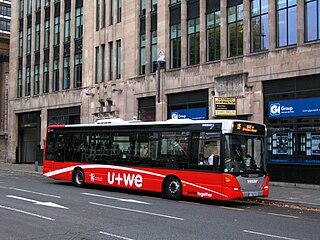
Wessex Bus was a bus operator in the West of England that operated from June 2007 until September 2018.

Tootbus, formerly Bath Bus Company is an English open top bus operator operating in Bath and Cardiff. It is a subsidiary of the RATP Group.
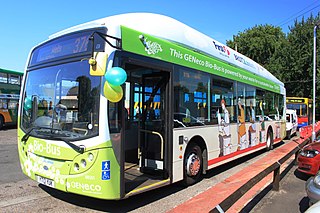
Bio-Bus is the UK's first bus powered entirely by human faeces and food waste.

On 3 December 2020, at about 11:20 GMT, a silo containing biosolids exploded in Avonmouth, Bristol, UK, killing four men, including a 16-year old apprentice, and injuring another person. Avon and Somerset Police declared a major incident, and a doctor and specialist paramedic in critical care from the nearby Great Western Air Ambulance headquarters attended the incident by both their rapid response car and emergency helicopter.

















